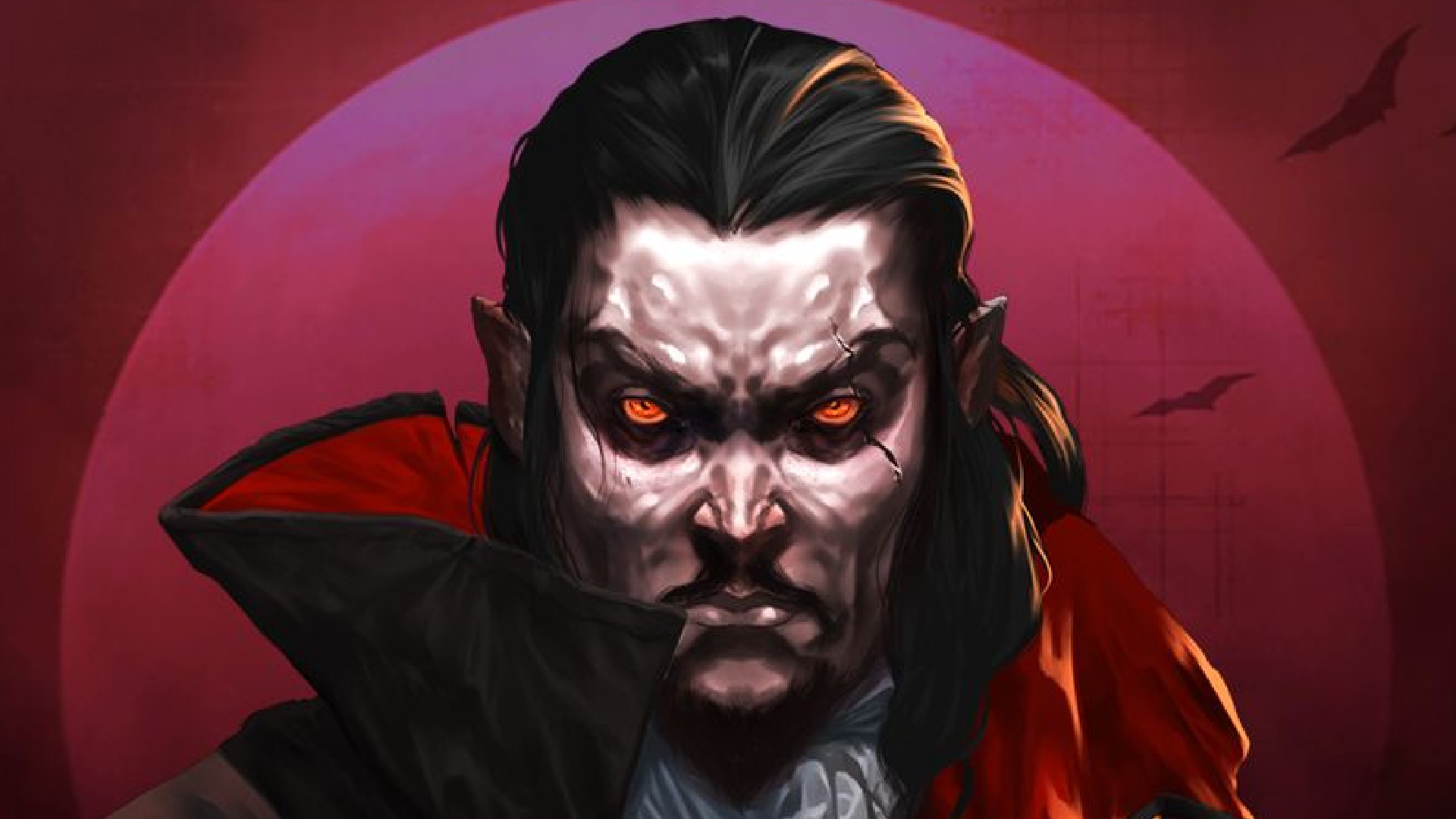
Luca Galante remembers clearly the first time Vampire Survivors was copied. "It was immediate," he says. "Even before the game got popular." At the time, he took it as a compliment.
After all, this was a game made years after Galante had given up any hope of working in the game industry, and one he'd prototyped over the course of a single afternoon. It was inspired by auto-shooter mobile games, which he was playing a lot at the time. "These games had something interesting about them – the auto-attacking, the very simple controls – but they were terrible," he says. "They were super-frustrating to play because they were full of advertisements. You had to play very short rounds, and then immediately they would try to sell you something." And so Galante decided to make one of his own.
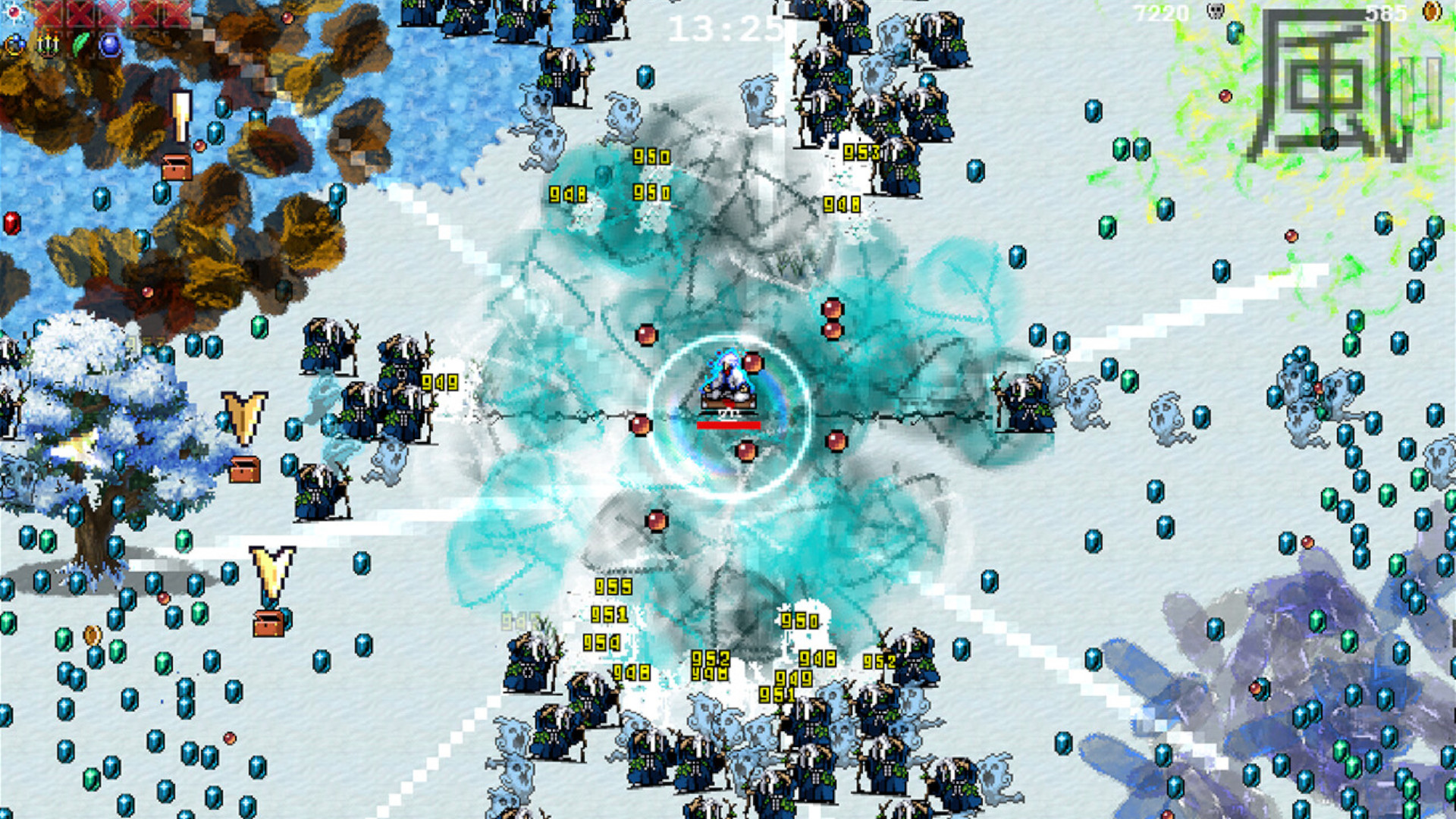
After combining his initial prototype with a Castlevania-themed sprite pack he'd bought online, he "fell in love with what I saw on screen". This was a new experience for Galante. Normally, when prototyping game ideas, "I'd get tired of them when I saw the system working," he says. "The moment that I need to start writing support for big data structures, for basically creating the tools to add more content, I usually lose most of my motivation." In this case, though, he kept returning to his project. "Every day, I'd just add a little something."
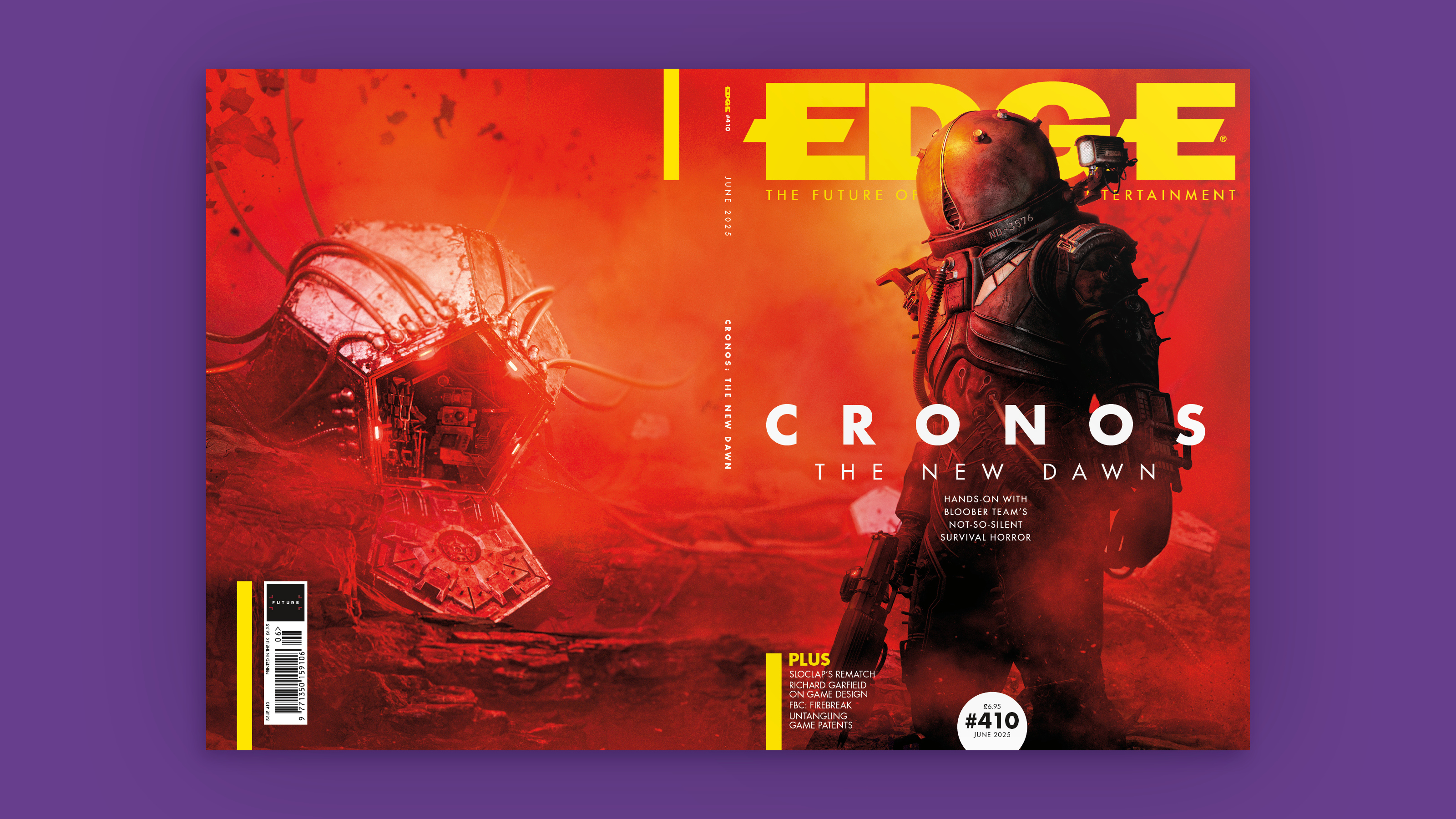
This feature originally appeared in Edge magazine. For more in-depth features and interviews diving deep into the gaming industry delivered to your door or digital device, subscribe to Edge or buy an issue!
Galante was pleased enough with the result to publish an early version on Itch.io in October 2021, and shared it on the Discord server for Phaser, the HTML5 framework he'd used to make the game. "I wanted to let other developers know what they could do with it," he explains. "One person was super-inspired, and they started to make their own version. It was flattering to see someone like the game so much. But those were the early days, where people were inspired for real."
Things soon changed. Galante likens it to a "gold rush", with other eager developers attracted by the millions of sales his game has racked up. This isn't a new phenomenon, of course: the success of PlayerUnknown's Battlegrounds was followed by a swarm of battle royales, Hearthstone by a wave of deckbuilders, and League Of Legends and Dota 2 by numerous MOBAs. But the relative simplicity of Galante's framework – and perhaps the more vulnerable position in which this solo developer found himself, without the backing of a big studio or publisher – drew all the chancers and criminal activity you'd expect to pop up around those 19th-century mining operations.
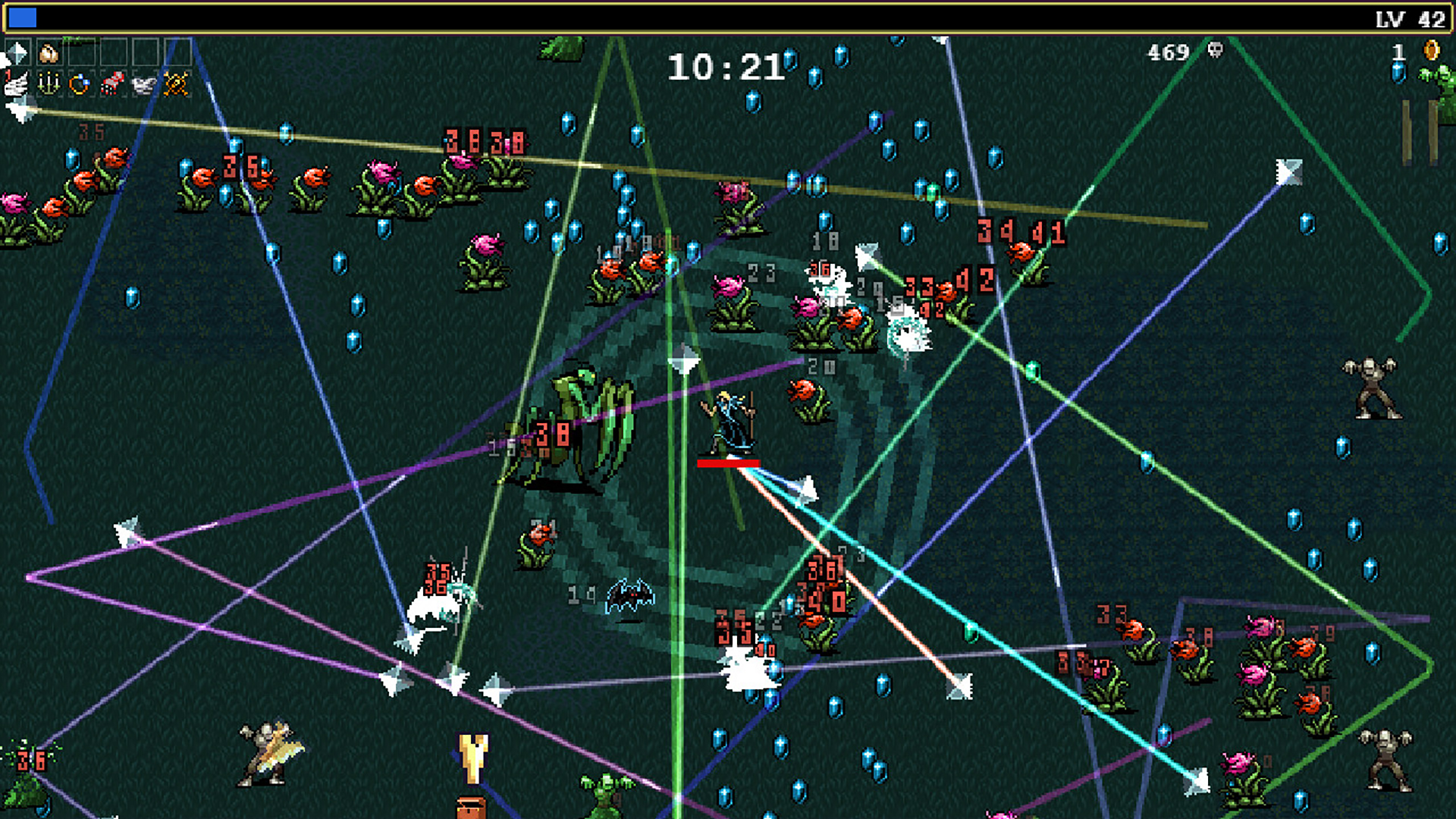
"People would copy and paste Vampire Survivors and publish it on other stores."
"The first thing I noticed was the literal ripoffs," he says. "People would copy and paste Vampire Survivors and publish it on other stores." When they spotted them, players would flag these frauds to Galante, who would then use his solicitor – he had to get a solicitor first – to get the listing taken down. These illegal copies were usually given away by their sprites: while Vampire Survivors' were based on a publicly available asset pack, Galante and his fledgling team at Poncle had made substantial, telltale changes to their animations and visual effects.
This all got more complicated with the next wave of games imitating Vampire Survivors, however, which arrived on Steam in their literal hundreds. Some were made using different asset packs, others had original artwork; some incorporated changes to the game's systems, others were close to identical. "I'm not naïve enough to believe that all those clones come from a place of inspiration," Galante says. He knows the motivation for most of the copies is easy profit – and isn't thrilled about it – but ultimately he's a realist. "It's how this industry works, like it or not. Some people are inspired, which is great, but there will always be vultures trying to make money out of whatever the latest trend is."
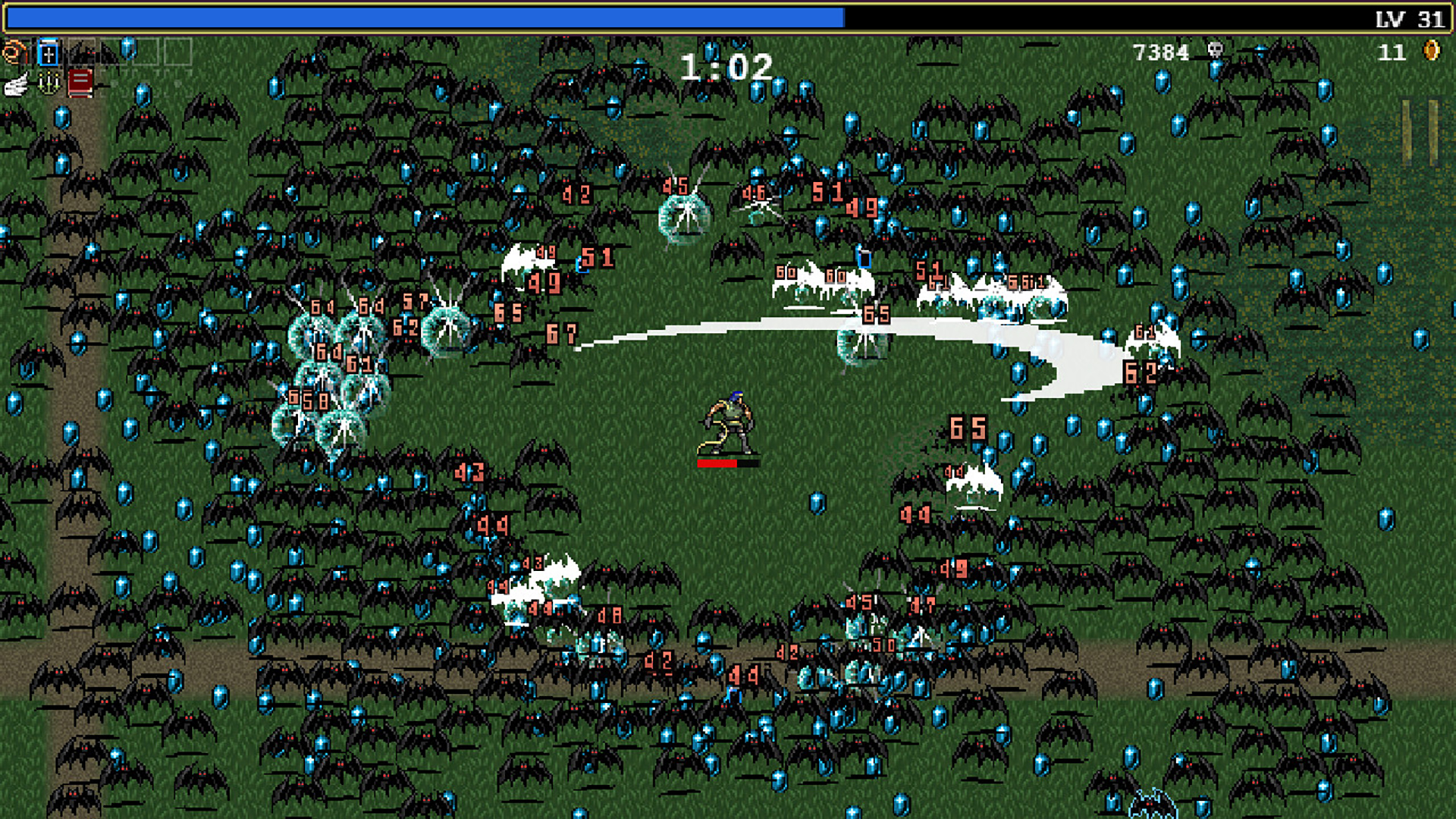
Still, he reflects, as bad as it was at its peak, things could have been much worse. "I got lucky. My success was lightning-fast. Players noticed me before any vulture could notice the ascension in sales. There are companies whose only goal is to keep track of what games are becoming successful, especially mobile stores, and then very quickly put a clone together, advertise that clone everywhere so that people think their clone is the real new thing, and they just kill those little indies." Galante accepts that he's in a privileged position here: "I have the luxury of just keeping my head down and working on my game without having to worry. For everyone else, they have to stand out among the hundreds."
"We were pretty scared," admits Anders Leicht Rohde, chief creative officer at Funday Games and director of Deep Rock Galactic: Survivor. "We saw this genre exploding. Some games passed through the sound barrier and succeeded – but it's a steep decline from the top five."
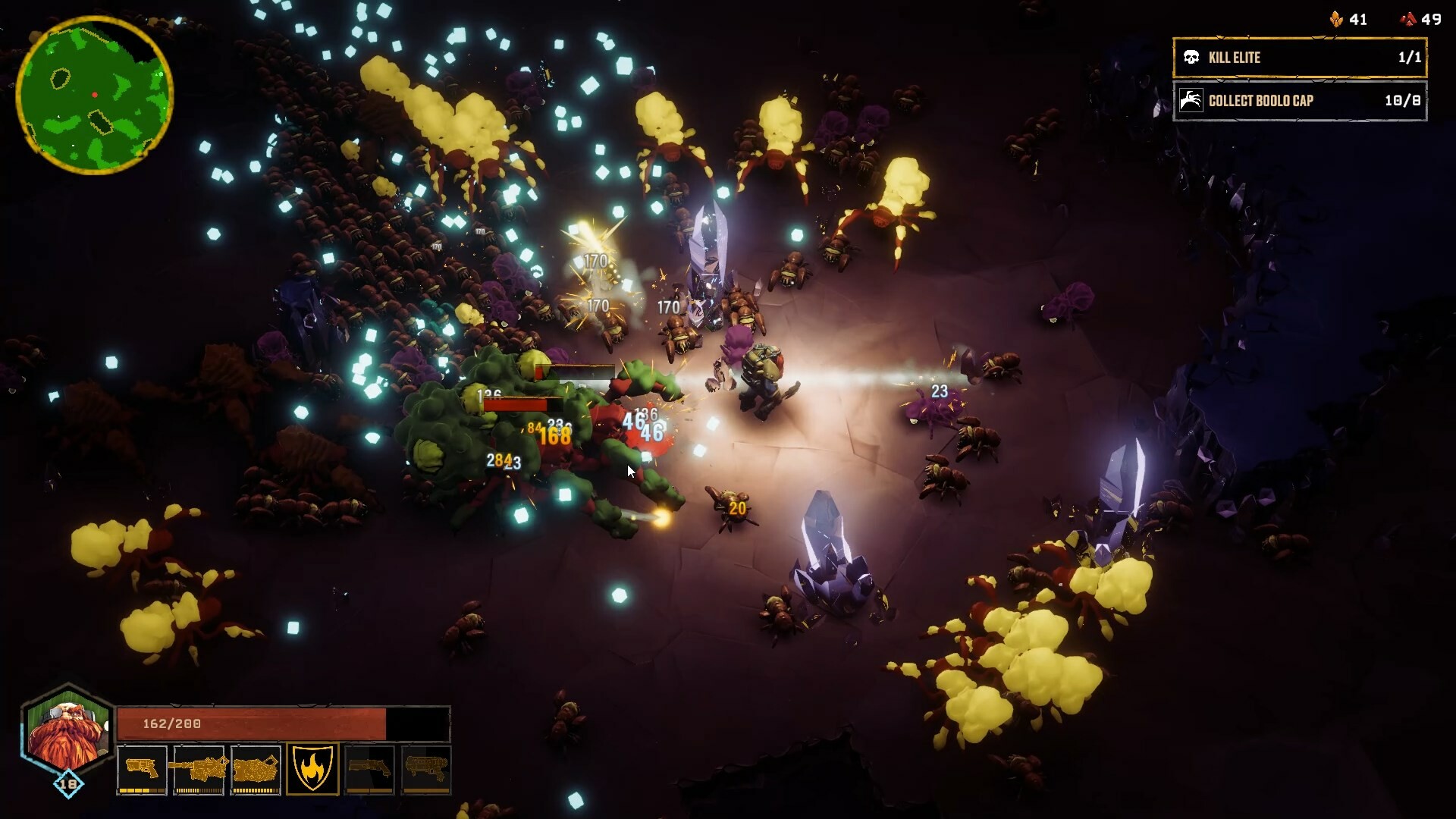
It didn't help that Funday arrived to this party comparatively late. The first seed for its game wasn't planted until August 2022, when Rohde caught up with a couple of old friends over a beer at Gamescom's Denmark stand. Those friends were Søren Lundgaard and Mikkel Martin Pedersen, two of the founders of Ghost Ship Games, developer of hugely successful co-op shooter Deep Rock Galactic. "They were truly psyched about playing Vampire Survivors," Rohde remembers. He'd only played a little of the game himself, but the other two were hooked. Pedersen speculated it would be a good fit for Deep Rock Galactic – but it was an idle chat, the kind of thing raised over beers and easily forgotten.
After the show, though, back at the Funday offices, Rohde found the idea taking root. He called Lundgaard with a simple pitch: "It's Vampire Survivors with mining!" He was given Ghost Ship's blessing to make a prototype, and Funday got to work in Unity, experimenting with transposing the mechanics of Poncle's game into three dimensions. But they made other changes, too, which would prove essential to the game's eventual success.
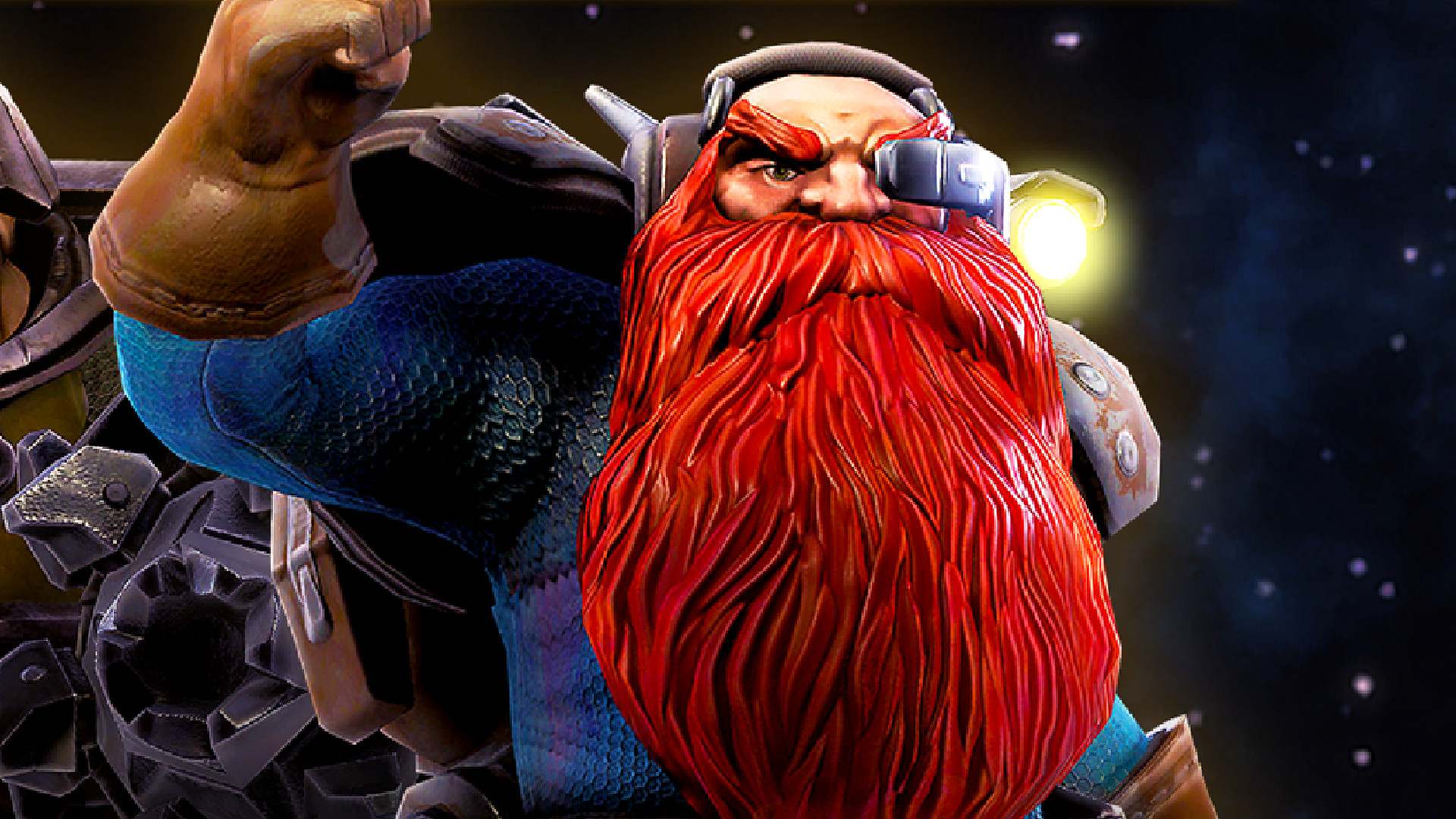
In Vampire Survivors, maps are static – and sometimes, as with the initial Mad Forest level, just large, featureless open spaces. While later updates added more complex level geometry, allowing players to exploit chokepoints to crowd enemies together, Funday took this further by letting you dig through that geometry. The enemies' pathfinding would update to take any new tunnels into account, and if there was a shorter route to reach you, the horde would change direction. This opened up fresh tactical possibilities: players could now mine through rocky outcrops to create sheltered cul-de-sacs or escape routes if the horde became overwhelming. "It was the innovation we needed, and it fit the IP perfectly," Rohde says.
Rohde and his team weren't content simply to adapt the formula laid down by Vampire Survivors. In fact, they were keen to address what they saw as flaws in Galante's original design. "Instead of having this endless 30-minute chore that is a Vampire Survivors run, we wanted to break it down into these chunks, and have missions and sub-missions," Rohde says. Each run in Deep Rock Galactic: Survivors is broken up into five mini stages, each ending in a boss fight, before calling in the drop-pod to evacuate.
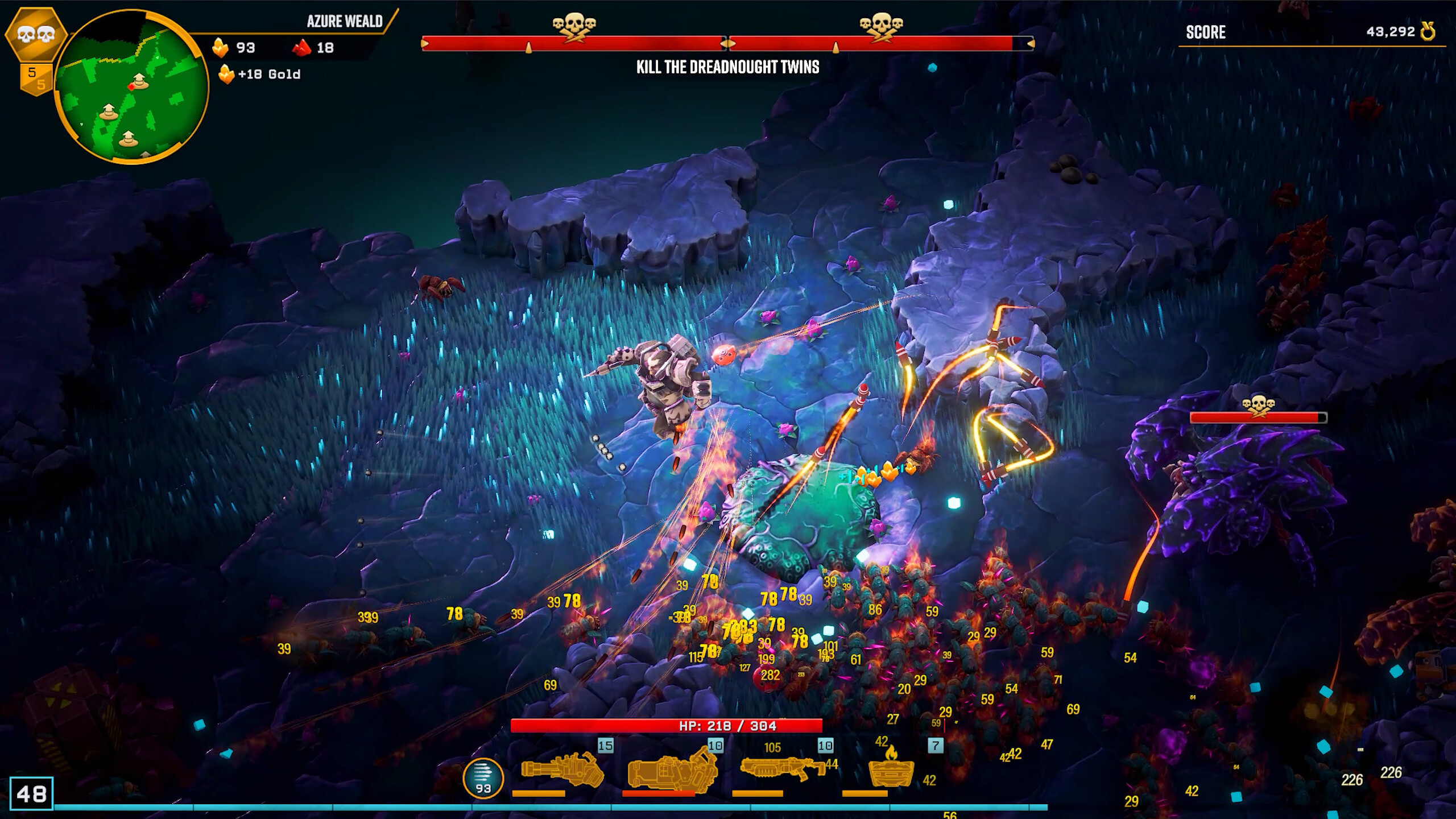
"We try everything we can to tempt people to go beyond what they should, so they end up in bad situations."
This was another idea taken from Ghost Ship's game, in which each mission ends with a frantic race back to the ship to avoid being left behind. In Deep Rock Galactic: Survivor, you have just 30 seconds to grab lingering XP and items and tie off any last sidequests – or instantly fail. Knowing that anything you don't gather will be lost forever gives the game a new way of tapping into a quality inherent to this genre: greed. Many a run of Vampire Survivors has been cut short by a scrap of loot luring you too close to the enemy horde, and Funday's take on things pushes this risk-reward calculation to new heights. "We wanted people to succumb to their greed and then die," Rohde laughs. "We try everything we can to tempt people to go beyond what they should, so they end up in bad situations."
By infusing Galante's blueprint with ideas borrowed from a disparate source, Funday had stumbled across a whole new layer to this nascent genre. Still, though, with "every new Steam Next Fest filled to the brim with Survivors-likes," as Rohde says, there was a growing fear within the development team that it wouldn't make any impact when they released it. Their solution was twofold.
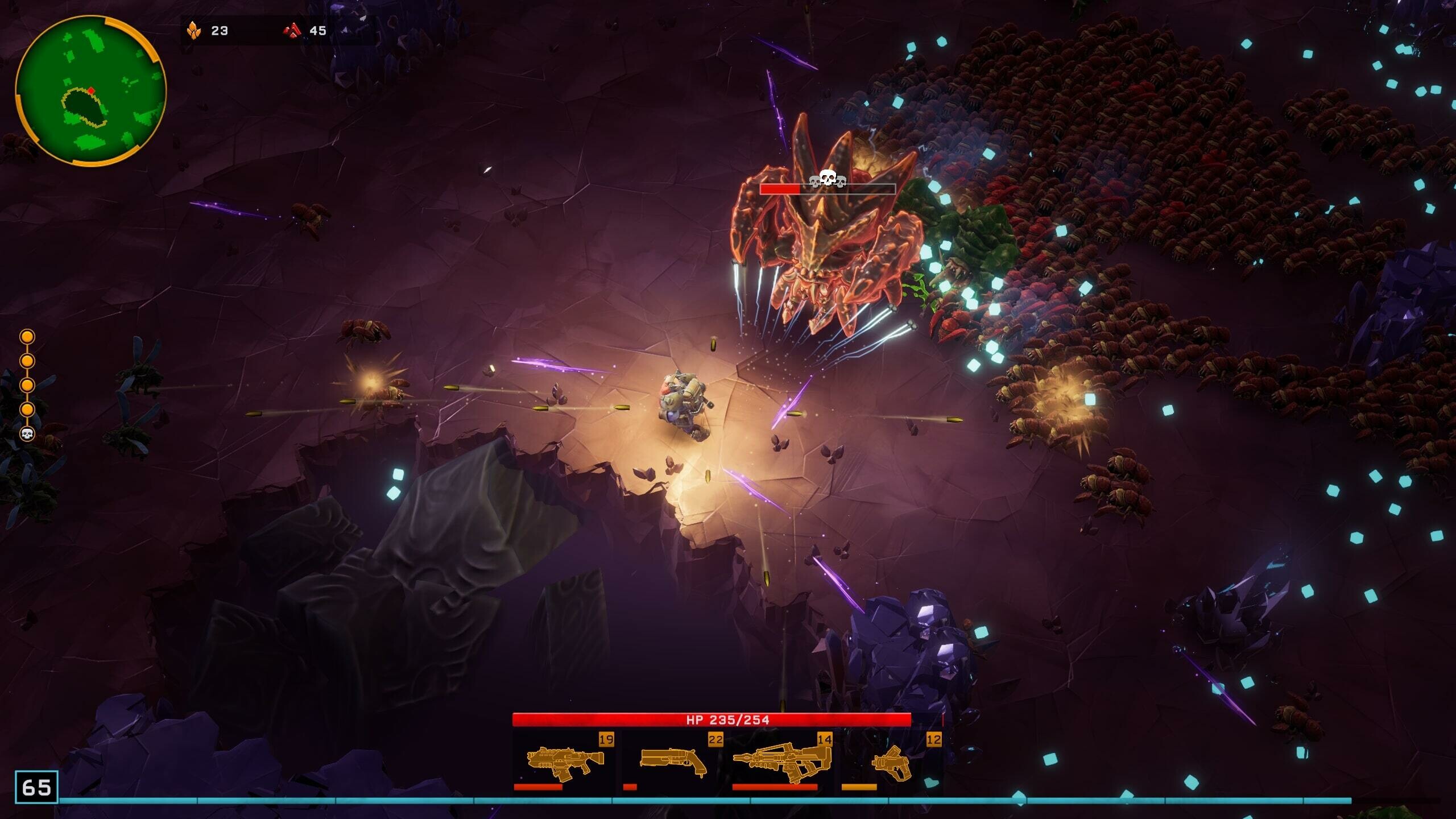
"We wanted to release the game fast to overtake the market," Rohde says – in fact, it was revealed in March 2023, barely six months after he'd gone for that fateful beer at Gamescom. Perhaps more important, though, is just how it was revealed – during Ghost Ship's annual On The Horizon stream. "They have one of the most active communities on the planet, and they craved a new game," Rohde explains. "We got a shit-ton of wish lists [after that, which] calmed everybody down." The team decided they could stand to work on the game for a little while longer rather than risk rushing it out of the door, now confident that an audience would be waiting to play it. And when Deep Rock Galactic: Survivor launched into early access in February 2024, it sold a million copies within a month.
Of course, not every developer has access to a platform like Ghost Ship's. And while launching a game of this type might seem like jumping onto a bandwagon, in reality certain developers have faced much rockier rides.
"Maybe I should have delayed the game's release by two months," Ouadi Huard says, reflecting on Rogue: Genesia's early-access launch in September 2022. Without the safety net that the Deep Rock Galactic name represented for Funday, Huard chose to launch after only a few months of development. "There was only one character," he says. "There weren't the talent or equipment systems. There were only the F-rank and D-rank [campaigns]."
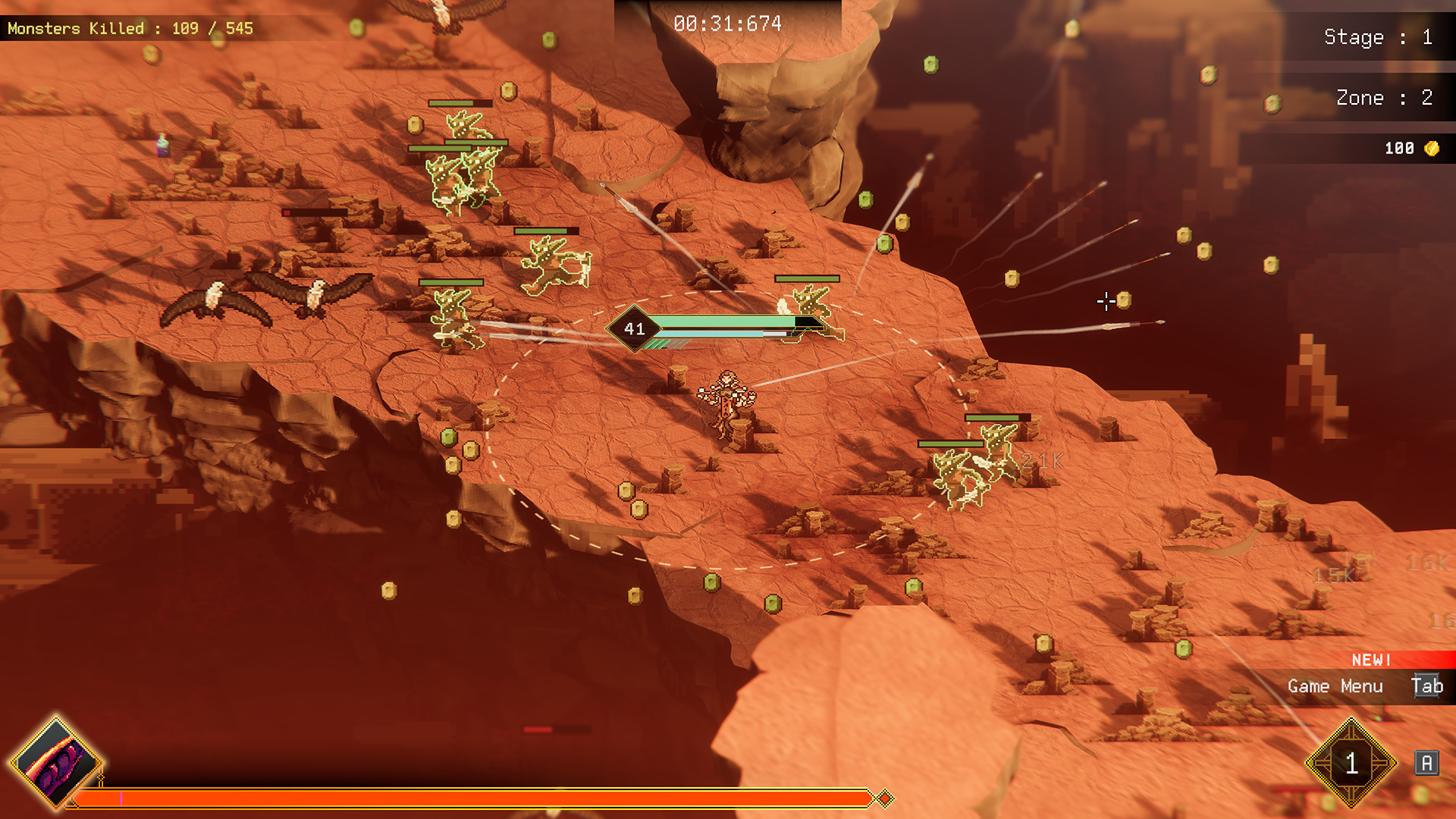
This lightweight offering created another problem in turn: "It didn't yet have enough content to be more expensive than Vampire Survivors." When there's a clear leader in a genre, Huard says, it can create a price ceiling for developers working in the same space. "Hades is an incredible game, but it's super-cheap for what it gives," he says by way of example. "Every Roguelike released afterwards was compared to it: 'You can't sell your game for $20 if you are a new developer – you have to price it at $10 because your game is less good than theirs'. It hurt a lot of developers."
He ended up pricing his game at $2.50, 49 cents less than Vampire Survivors. It was only at the end of 2022, after Poncle increased its price to $4.99, and he'd added much more content to Rogue: Genesia, that he felt comfortable increasing to match that price. Then, in August 2023, Huard began selling his game for more than Galante's: "With update 0.9, I believed the game was rich enough in content to increase the price to $9."
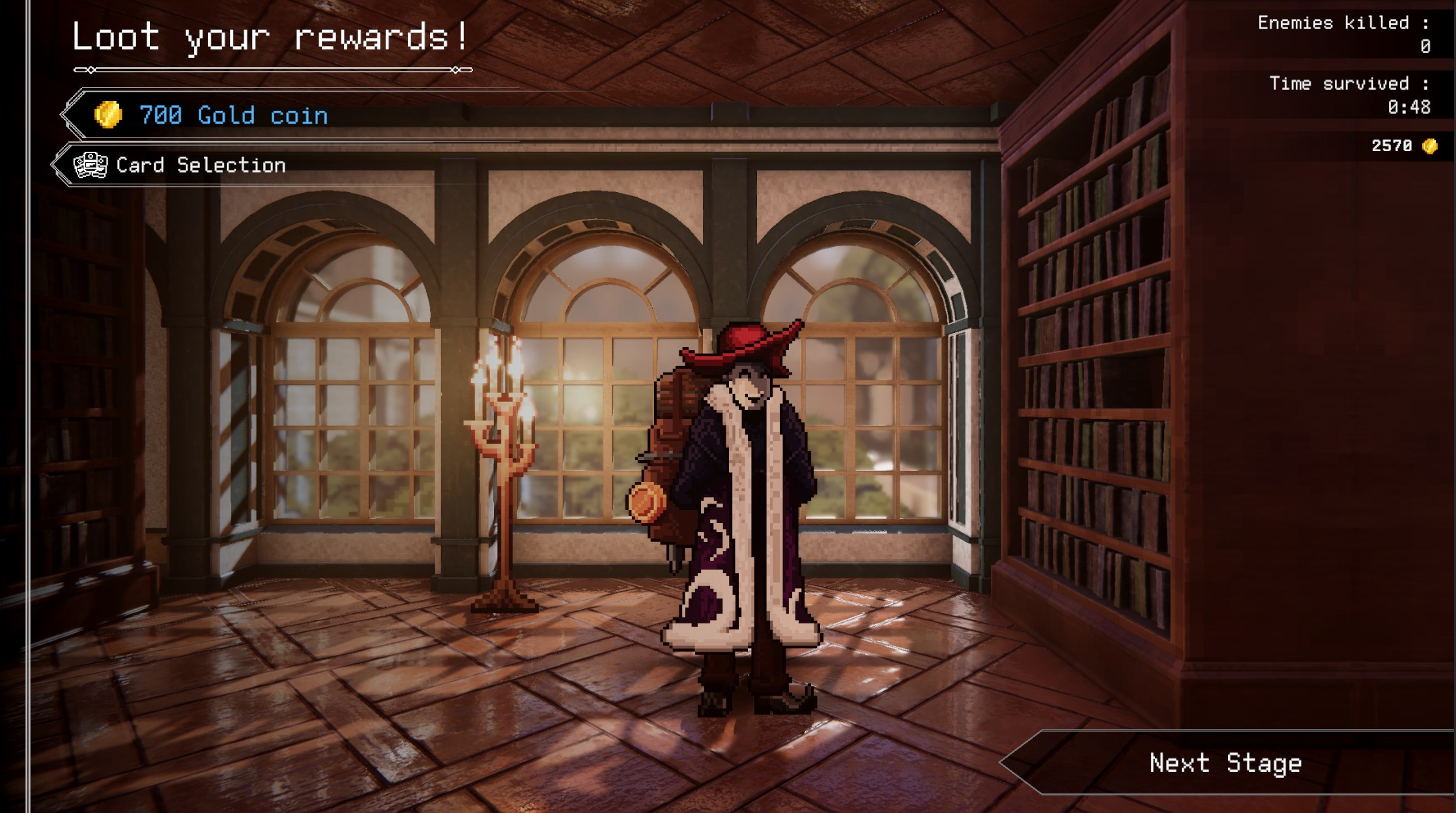
"I like the idea of having a lot of upgrades you can combine."
The irony here is that Huard's original inspiration for Rogue: Genesia wasn't actually Vampire Survivors at all, but rather the top-down Roguelike space shooter Nova Drift, which had been funded via a modest Kickstarter back in 2017; Huard first played it a couple of years later. In that game, each run has you upgrading a simple starting weapon with overlapping buffs that can radically alter its behaviour. For example, what starts as a single-shot laser can become a cannon that fires explosives that burst into shrapnel that homes in on enemies. "I like the idea of having a lot of upgrades you can combine," Huard says. "And I always wanted to make a game like that."
By the time Vampire Survivors arrived in 2021, though, Huard had yet to do anything with this idea. However, the game suggested a format that would fit the ideas he'd developed while playing Nova Drift, and he started work on a prototype – but shelved it after three weeks: "It just didn't work." The prototype didn't feel different enough from the original. Only later, when Huard had the idea to combine his prototype with a campaign map lifted from Slay The Spire, did he start building something he liked. With many stages to a single run, players' characters could now accumulate many different skills and upgrades, better showing off the kind of upgrade complexity Huard had so admired in Nova Drift. "It was very quick," he recalls. "You got a character that moved and auto-attacked – it was super-simple, and there was very little content. Some art was just a circle." At launch, Rogue: Genesia drew over 5,000 players in one day. "The game sold much more than I expected," Huard says, and that bloom of sales "allowed me to work full-time on the game."
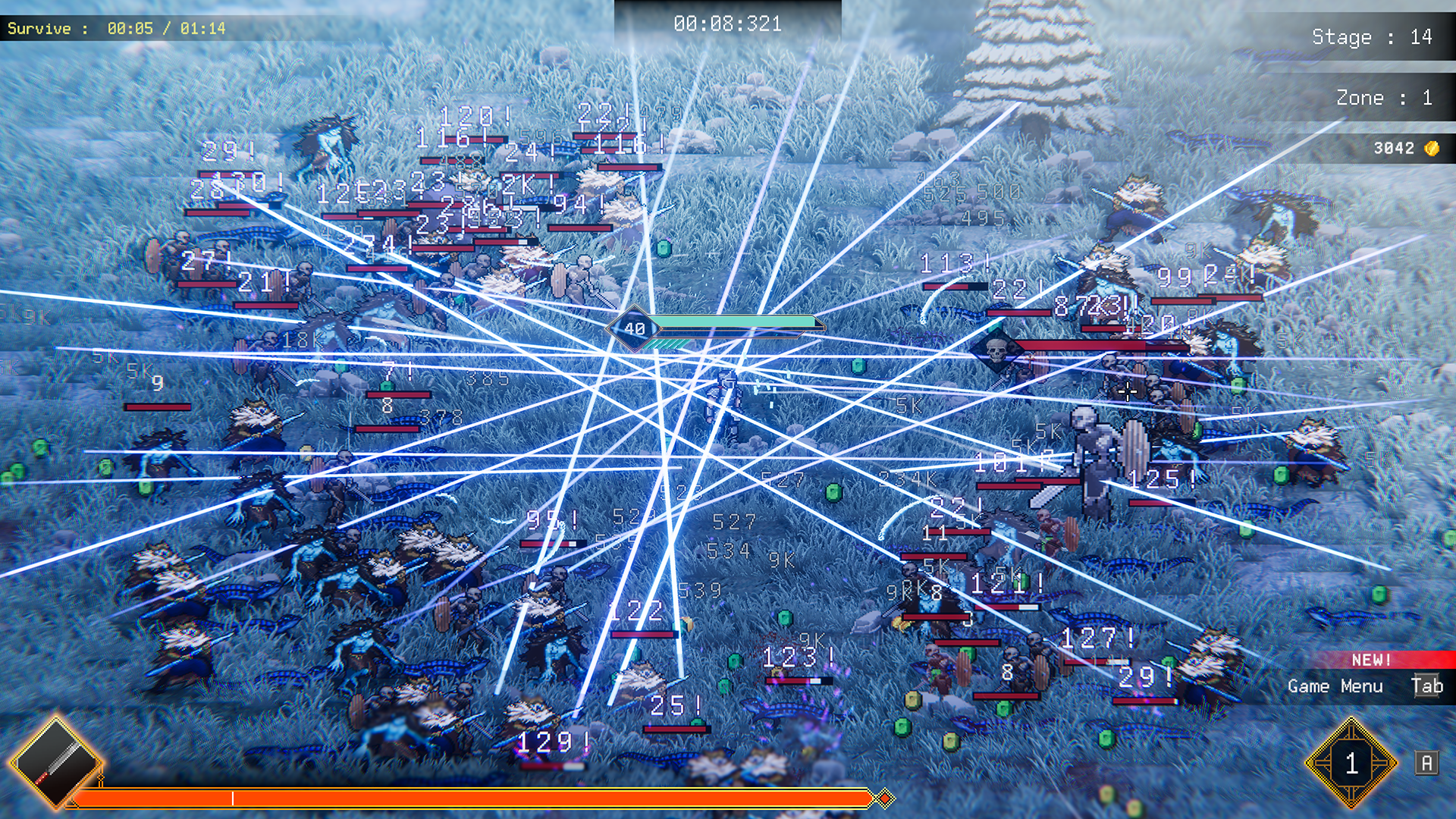
Having survived more than a year amid the fleet of games following in Vampire Survivors' wake, Rogue: Genesia and Deep Rock Galactic: Survivor have themselves become reference points for other developers – including, it turns out, their respective creators.
When you level up in Deep Rock Galactic: Survivor, your upgrade choices are presented like playing cards, with a simple list at the bottom flagging what damage and elemental types it will synergise with. "I'm going to steal that," Huard decided. "It would improve the way people play." And Funday can hardly complain, given it did the same thing itself.
"We looked at Soulstone Survivors and how they tag stuff," Rohde says. When you choose an upgrade that buffs fire damage, for example, it will apply to all the weapons with the fire tag. Rather than try to reverse-engineer this system in secret, Rohde reached out to Allan Michael Smith, Soulstone Survivors' lead developer. "I had some questions about the game," Rohde says, "We just chatted on Discord. It always helps to talk to people and get a broad understanding of the industry you're working in."
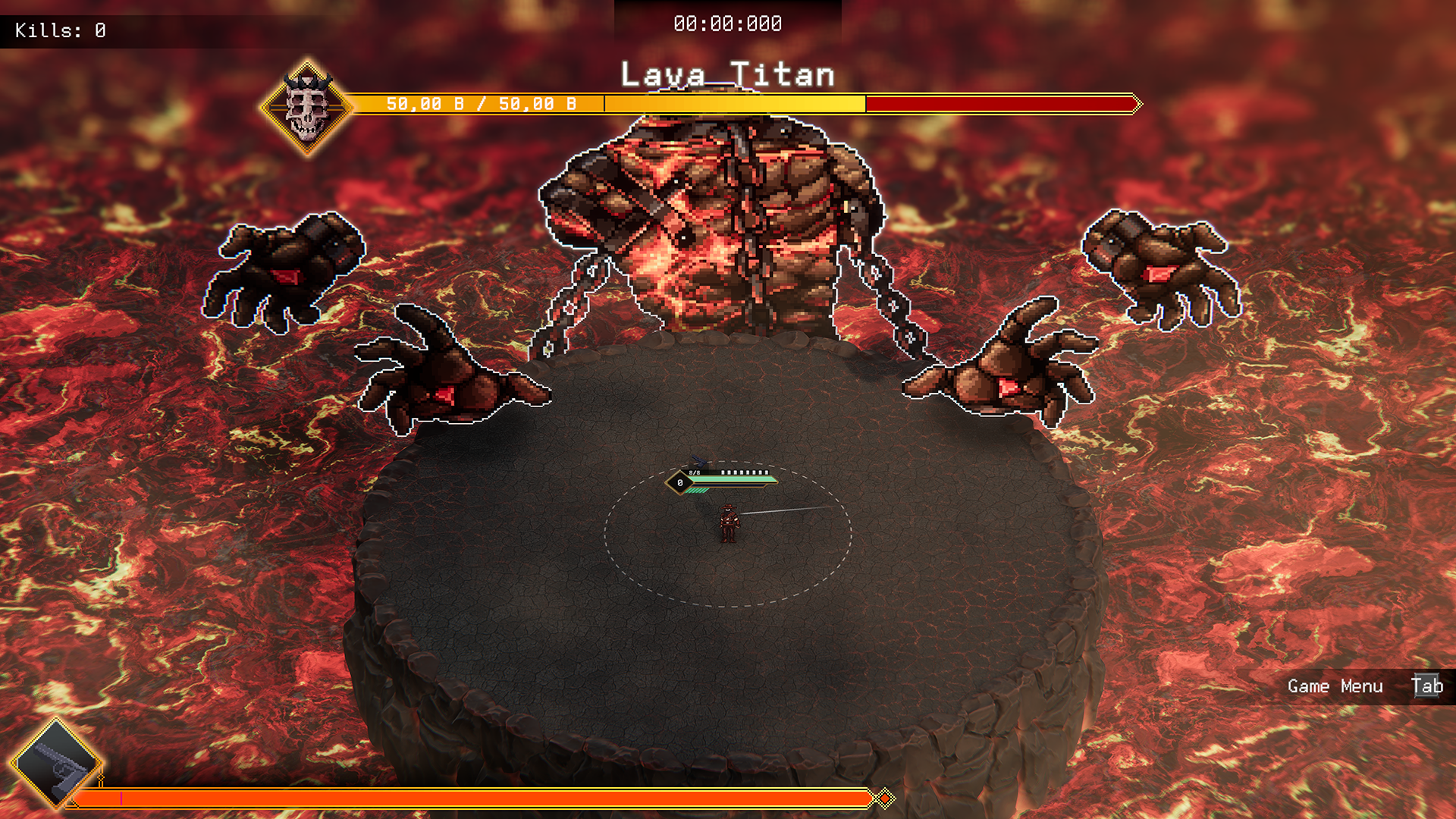
Rohde isn't shy about the fact that, as it worked on its game, Funday was constantly assessing the competition. "We broke them down into features," he says. "Like, we want this feature from Soulstones Survivor, this feeling from Rogue: Genesia… It wasn't only Vampire Survivors. There were four or five key reference games."
"It sounds weird but we try to keep our innovation as low as possible."
In fact, he points out, the team generally won't attempt to reinvent the wheel if they don't have to. "It sounds weird but we try to keep our innovation as low as possible," he says. "We'll say, 'it's this game but with that'. It takes so much time to innovate. Sometimes you find the hidden Holy Grail of game design, but often indie developers sit for five years trying out stuff. We're a studio of 50 people with bills to pay, so we can't do that."
Besides, he says, it's a fool's errand to try to avoid the influence of peers entirely: "I do not believe creative work just exists in a vacuum, where you can just decide to be creative and then you're innovative and not inspired by anything. You're always copying, even if you try to sit in your basement and not play other games."
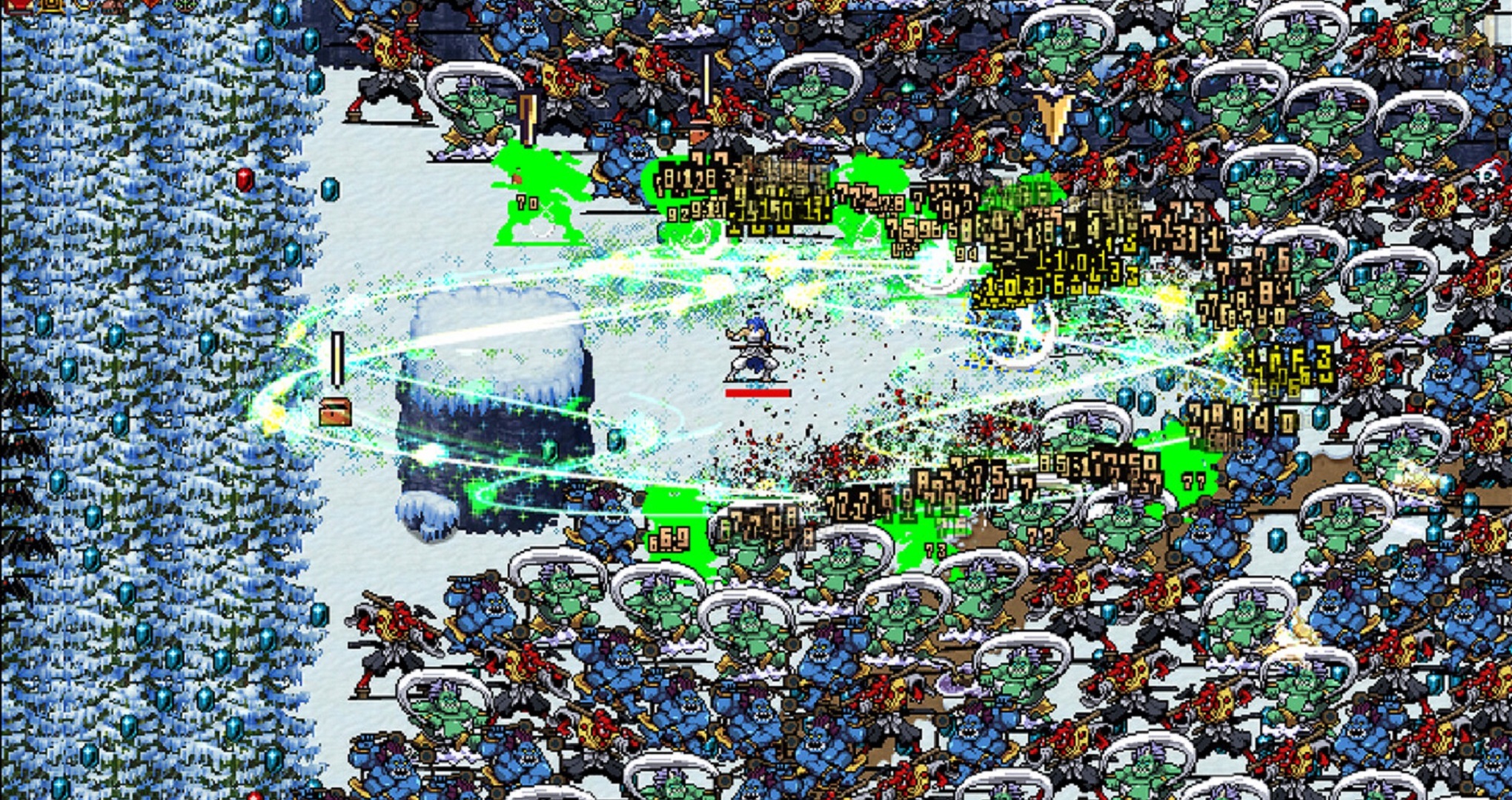
All three of the developers we've spoken with for this article had other games in mind when they began working. Galante started with those mobile titles, so close to an idea he liked, and made Vampire Survivors in response. The best of these games are a critique of what's come before, filtered through the developer's own taste – Huard preferring the overlapping upgrades of Nova Drift to the simpler single-stat buffing of Vampire Survivors, Rohde breaking up the length of its runs into smaller chunks.
Still, as the landscape has shifted from straight copies to games that explore legitimate twists on Galante's bestselling design, he's not much interested in exploring. "I do my best to stay away," Galante says. "Comparisons are destructive." He doesn't want to be influenced by these, either in adding a feature he's taken from elsewhere or not adding something because he sees it's already been done by someone else. "From a creative perspective, it's too risky to go and play someone else's game." And he suspects he wouldn't enjoy them much anyway. "I have impossible taste," Galante says.
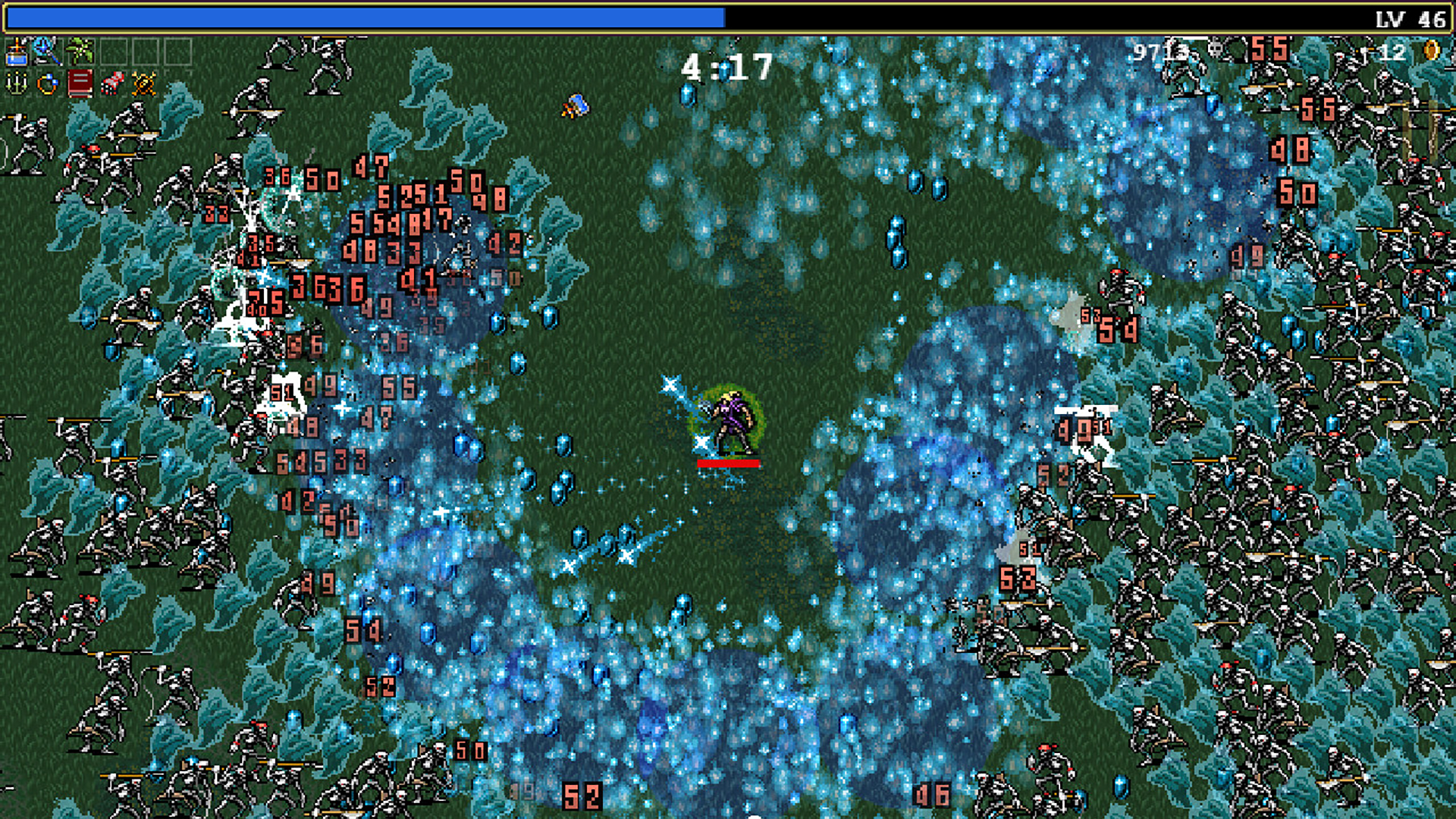
"I criticise everything. Sitting down and enjoying a game is very difficult for me."
"I criticise everything. Sitting down and enjoying a game is very difficult for me. I still play Vampire Survivors just to enjoy it, and that's because I've made it to appeal specifically to my taste. So if I go and play a game like Vampire Survivors, but made by someone else, the chances of me liking it are very slim."
We can't help but detect a certain purist streak in Galante – the very thing, perhaps, that made this unlikely success story possible in the first place. "I had given up on the idea [of success] a long time ago," he reflects. "Vampire Survivors is the first game I made just for fun. That might be the key ingredient for its success. Whatever I'm going to do next, and however I'm going to keep working on Vampire Survivors, will be for fun. If I move away from that idea, and if I start thinking about competitors that I need to keep an eye on, or that I need to investigate the market and make stuff specifically for them… That's not what I want to do. It's just not going to work."
Galante is not particularly interested in his game as a product. And, given the privileged position that Vampire Survivors has afforded him, he's keen to hold onto that purism as much as possible. "I don't want to start having to look around in order to try to maintain the success. The success was an accident. It's fantastic, it's beautiful – I'm very grateful to the players for that. But, again, that should not be the aim. Otherwise, we enter a completely different world – which I'm not keen on, honestly."








